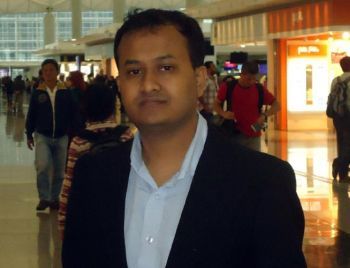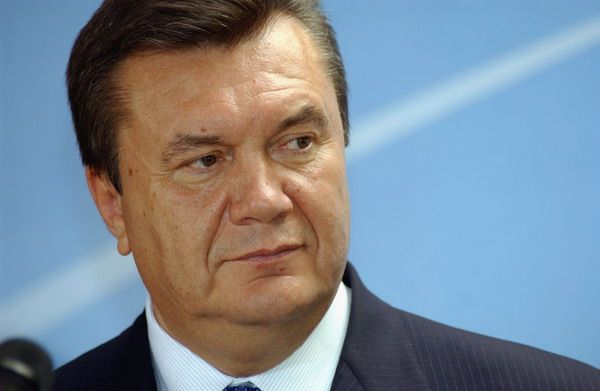
Publisher:
Bonnie King
CONTACT:
Newsroom@Salem-news.com
Advertising:
Adsales@Salem-news.com

~Truth~
~Justice~
~Peace~
TJP
Jan-21-2014 10:40

 TweetFollow @OregonNews
TweetFollow @OregonNews
Ukraine: Amendments Curtailing Fundamental Rights and Freedoms Passed Into Law
William Gomes, Human Rights Ambassador for Salem-News.comImmediately and unconditionally repeal Law no. 3879, as it curtails fundamental human rights and freedoms in the Ukraine- William Nicholas Gomes
 William Gomes, Human Rights Ambassador for Salem-News.com |
(WASHINGTON, DC) - On 17 January 2014, Ukraine's President Mr Viktor Yanukovych signed a set of amendments into law which will severely restrict human rights and fundamental freedoms in the country.
 Ukraine President Viktor Yanukovych |
Law no. 3879, “On Judiciary and Status of Judges and to Procedural Laws with regard to Additional Measures to Protect Security of Citizens” makes amendments to the Criminal Code, the Code of Administrative Proceedings, the Law on Civic Associations, the Law on Security Services, the Tax Code, the Law on the Status of Judges and the Law on Telecommunications. The Ukrainian Parliament voted on the law on 16 January 2014, in a clear violation of parliamentary procedure.
The amendments were introduced into parliament on 14 January 2014 by two MPs from the Regional Party, Mr Vadym Kolesnichenko and Mr Volodymyr Oliynyk. During the morning session of parliament on 16 January 2014, the set of amendments were voted on “in general”, without prior discussion of the general principles or particular articles and without preliminary approval of the parliamentary committee. Additionally, MPs voted by a show of hands rather than by using the regular electronic voting system. It is alleged that the votes were counted in a matter of seconds and that an estimation was made based on the number of MPs in the parliamentary groups. The parliamentary session was then closed until 4 February 2014. Now that it has Presidential approval, the legislation will come into force the day after it has been published in two official Ukrainian newspapers.
The new law reportedly imposes severe restrictions on the media and internet, imposes new restrictions on all forms of protest, undermines the activities of non-governmental organisations (NGOs) and religious organisations, as well as facilitating impunity within law enforcement bodies. In an echo of the 2012 Russian law on foreign agents, the law also introduces a requirement that NGOs directly or indirectly receiving funding from any foreign or international entity or person and also engaging in so-called political activity must register as a “foreign agent” with the Ministry of Justice. “Political activity” is defined as “participation in the organisation and hosting of political actions which aim to influence decision-making by state authorities, to change state policy, or to inform public opinion with a view to achieving these aims”. NGOs which fall under this criteria should register within three months of the enactment of the new law. Thereafter, they will have to include the label “foreign agent” in their name, to mark all their publications as “foreign agent” and to pay taxes on any revenue.
Existing sanctions for charges relating to assembly and protest, such as “violation of public order”, “mass disorder” and “resistance to police” will be reinforced by the amendments. They also restrict moving in a column of more than five vehicles; participation in a rally when wearing a mask, helmet or uniform; installation of a tent, stage or any small construction or violation of established procedure for organising or holding assemblies. The amendments further criminalise a range of actions such as “extremist activity”; insulting police officers or the judiciary; the collection and dissemination of personal data of the police and judiciary; and blocking the entrance to private residences or administrative buildings. It has been suggested that many of these amendments are a knee-jerk reaction to the recent protests in the Ukraine.
The Ukrainian Parliament also extended an amnesty to crimes committed by any person from 21 November 2013 until 26 December 2013, including offences such as infliction of bodily injuries, harassment of journalists or the abuse of authority. As a result, public officials and riot police who were involved in physical brutality against peaceful protesters will be exempted from criminal liability. The new provisions further provide for trial in absentia of a defendant.
The amendments will also severely curtail the right to freedom of expression in the country. They stipulate that all internet providers must now be licensed and that internet media must register with the state. Further, all telecommunications operators will be obliged to buy and install equipment aimed at intercepting data belonging to their clients at the request of law enforcement officials. The National Commission for Communications can now order that a website be blocked without a court decision, based on “expert opinion”. Additionally, the purchase of pre-paid mobile phone cards will now require that the buyer register their passport details. The amendments also reintroduce criminal liability for defamation in the media or online.
Human Right Ambassador for Salem-News.com , William Nicholas Gomes is concerned that, aside from the flagrant violations of the procedural rules of the Ukrainian Parliament, the amendments also violate Article 22 of the Ukrainian Constitution, which stipulates that the “content and scope of existing rights and freedoms shall not be diminished by the adoption of new laws or by introducing amendments to effective laws”. The legislation further undermines the Ukraine's obligations under international human rights law, in particular under the Universal Declaration on Human Rights, the International Covenant on Civil and Political Rights and the European Convention on Human Rights. Human Rights Ambassador for Salem-News.com condemns the enactment of such draconian legislation as there are serious concerns that it will seriously impact on the work of those defending human rights and fundamental freedoms in the country.
| “ |
The amendments were introduced into parliament on 14 January 2014 by two MPs from the Regional Party, Mr Vadym Kolesnichenko and Mr Volodymyr Oliynyk. During the morning session of parliament on 16 January 2014, the set of amendments were voted on “in general”, without prior discussion of the general principles or particular articles and without preliminary approval of the parliamentary committee. Additionally, MPs voted by a show of hands rather than by using the regular electronic voting system. It is alleged that the votes were counted in a matter of seconds and that an estimation was made based on the number of MPs in the parliamentary groups. The parliamentary session was then closed until 4 February 2014. Now that it has Presidential approval, the legislation will come into force the day after it has been published in two official Ukrainian newspapers. The new law reportedly imposes severe restrictions on the media and internet, imposes new restrictions on all forms of protest, undermines the activities of non-governmental organisations (NGOs) and religious organisations, as well as facilitating impunity within law enforcement bodies. In an echo of the 2012 Russian law on foreign agents, the law also introduces a requirement that NGOs directly or indirectly receiving funding from any foreign or international entity or person and also engaging in so-called political activity must register as a “foreign agent” with the Ministry of Justice. “Political activity” is defined as “participation in the organisation and hosting of political actions which aim to influence decision-making by state authorities, to change state policy, or to inform public opinion with a view to achieving these aims”. NGOs which fall under this criteria should register within three months of the enactment of the new law. Thereafter, they will have to include the label “foreign agent” in their name, to mark all their publications as “foreign agent” and to pay taxes on any revenue. Existing sanctions for charges relating to assembly and protest, such as “violation of public order”, “mass disorder” and “resistance to police” will be reinforced by the amendments. They also restrict moving in a column of more than five vehicles; participation in a rally when wearing a mask, helmet or uniform; installation of a tent, stage or any small construction or violation of established procedure for organising or holding assemblies. The amendments further criminalise a range of actions such as “extremist activity”; insulting police officers or the judiciary; the collection and dissemination of personal data of the police and judiciary; and blocking the entrance to private residences or administrative buildings. It has been suggested that many of these amendments are a knee-jerk reaction to the recent protests in the Ukraine. The Ukrainian Parliament also extended an amnesty to crimes committed by any person from 21 November 2013 until 26 December 2013, including offences such as infliction of bodily injuries, harassment of journalists or the abuse of authority. As a result, public officials and riot police who were involved in physical brutality against peaceful protesters will be exempted from criminal liability. The new provisions further provide for trial in absentia of a defendant. The amendments will also severely curtail the right to freedom of expression in the country. They stipulate that all internet providers must now be licensed and that internet media must register with the state. Further, all telecommunications operators will be obliged to buy and install equipment aimed at intercepting data belonging to their clients at the request of law enforcement officials. The National Commission for Communications can now order that a website be blocked without a court decision, based on “expert opinion”. Additionally, the purchase of pre-paid mobile phone cards will now require that the buyer register their passport details. The amendments also reintroduce criminal liability for defamation in the media or online. I am concerned that, aside from the flagrant violations of the procedural rules of the Ukrainian Parliament, the amendments also violate Article 22 of the Ukrainian Constitution, which stipulates that the “content and scope of existing rights and freedoms shall not be diminished by the adoption of new laws or by introducing amendments to effective laws”. The legislation further undermines the Ukraine's obligations under international human rights law, in particular under the Universal Declaration on Human Rights, the International Covenant on Civil and Political Rights and the European Convention on Human Rights. I condemn the enactment of such draconian legislation as there are serious concerns that it will seriously impact on the work of those defending human rights and fundamental freedoms in the country. I urge the Ukrainian authorities to:
- See more at: http://www.frontlinedefenders.org/node/24708/action#sthash.TOZ0MsRl.dpuf |
” |
 |
 |
 |
Articles for January 20, 2014 | Articles for January 21, 2014 | Articles for January 22, 2014
Salem-News.com:





Terms of Service | Privacy Policy
All comments and messages are approved by people and self promotional links or unacceptable comments are denied.
[Return to Top]
©2025 Salem-News.com. All opinions expressed in this article are those of the author and do not necessarily reflect those of Salem-News.com.